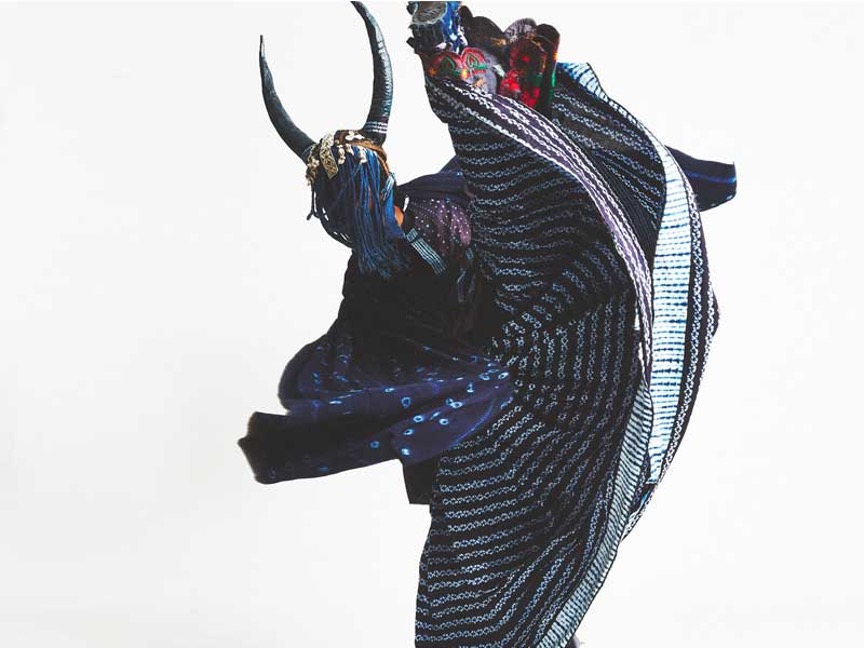CAA News Today
CWA Picks February-March 2021
posted Mar 12, 2021
February and March Picks from the Committee on Women in the Arts celebrate a selection of events, exhibitions, and calls for work and participation featuring feminist and womxn artists and address issues about social justice and ethics in intersectional and transnational perspectives.

Dancer Christ Walker in his portrayal of Laura Anderson Barbata’s Rolling Calf in Intervention: Indigo, part of the exhibition Laura Anderson Barbata: Transcommunality, Newcomb Art Museum of Tulane University. Photo by Rene Cervantes.
Laura Anderson Barbata: Transcommunality
January 16–October 2, 2021
Newcomb Art Museum of Tulane University, New Orleans, LA
Laura Anderson Barbata’s (b. 1958) socially engaged, activist, and environmentally sustainable practice is on view in a dynamic exhibition curated by Laura Blereau at the Newcomb Art Museum. Transcommunality enriches bold concepts of global collaboration and cultural exchange, civil and indigenous rights, and human connection and belonging across geographical borders. Anderson Barbata was born in Mexico City, Mexico, and works between Mexico and the United States. This exhibition unites five projects and series across the Americas, showcasing a wide swath of media and community-based approaches such as street theater, arts education, printmaking and book making, textiles, wearable sculpture, photographs, and stilt dancing. Among the works on display are paper making techniques and workshops utilizing Ye’Kuana Amazon wood printing blocks for body printing and printmaking in Venezuela (Amazonian moriche palm fiber); fabric costumes worn by stilt dancers and carnival performers, including Moko Jumbies in Trinidad and Tobago and the Brooklyn Jumbies of New York, West Africa, and the Caribbean, as well as the significant artisan culture of los Zancudos de Zaachila from Oaxaca, Mexico. Transcommunality also documents Anderson Barbata’s extraordinary intervention and efforts to repatriate the body of Julia Pastrana, a nineteenth-century Mexican woman grotesquely exploited for her physical disabilities. As Anderson Barbata avers, reciprocity fundamentally underscores her artistic work and approach.
Mildred Thompson: Throughlines, Assemblages and Works on Paper from the 1960s to the 1990s
February 18–March 27, 2021
Galerie LeLong & Co., New York
A selected survey of Mildred Thompson’s (1936–2003) mature practice into the 1990s, Throughlines explores the African American artist’s dynamic experimentation in found and manipulated wood, free-standing assemblages and sculptures, and dynamic utilisation of abstraction in works on paper and prints.
February 6–March 9, 2021
Leslie–Lohman Museum of Art, New York
The first comprehensive retrospective on Chicana artist Laura Aguilar (1959–2018), Show and Tell presents more than 70 photographs and videos spanning three decades. The development of Aguilar’s performative, feminist, and queer genres encompass candid portrayals of LGBTQ+ and Latinx communities; nude self-portraits serve as powerful investigations on the complicated colonial histories of racial and sexual injustice and personal expressions on vulnerability and beauty.
January 21–May 8, 2021
Ulrich Museum of Art, Wichita, Kansas
This exhibition explores Renée Stout’s (b. 1958) print portfolio from 2012 titled Ghosts, currently in the collection of the Ulrich Museum of Art, and in dialogue with six Yoruba objects from present-day Nigeria in the Wichita State University’s Lowell D. Homes Museum of Anthropology. Stout’s seminal artistic research into the histories of African American heritage and the African diaspora are demonstrated in Ghosts, haunting monotypes that touch upon syncretic belief systems and visual narratives of Haitian Voudou and American Voodoo and Hoodoo, especially as these religions are expressed in marginalized Black communities.
February 25–April 17, 2021
Nara Roesler, New York
The inaugural solo exhibition in the US of Brazilian multidisciplinary artist Amelia Toledo (1926–2017), the artist is best known for her constructive investigations that traverse the material boundaries of the natural world and landscape, and offer new definitions of ecological concretism through the technical and physical examination of shells, stones, and wood. Toledo’s later Penetrables, on view, explore inhabitable space through hanging color fields as raw canvas and organic pigments. Although associated in her career with many of the foremost postwar neo-concrete Brazilian artists, including Mira Schendel, Tomie Ohtake, Hélio Oiticica, and Lygia Pape, Toledo maintained a separate identity. On her hands-on and observational approach to her practice, Toledo offered: “It’s not even just a question of difference processes; each material constructs itself, proposes itself in the form of certain consequences.”
Les Femmes Folles Presents: Feminists Connect
Launching March 2021
This curated online exhibition includes work by 40 international artists, artist statement and bios received in response to a call inviting participants to reflect on the theme Feminist Connect and the possibilities for the arts and feminist enquiry. Driven by feminist ethics of care, the curators of this online art exhibit, Sally Brown and Leslie C. Sotomayor, became actively invested in selecting artworks that engage through lived experiences and embodiments into conversations on larger social issues such as love, grief or invisibility. The curatorial process was dialogic and centered on co-creation of knowledge with care.
The Vagina Museum’s ‘Cliterature’ book club – Feminism, Interrupted
Thursday 22nd April 2021, 7:00 PM – 8:30 PM UK Time
Zoom
Cliterature, the Vagina Museum’s book club, welcomes everyone to engage in readings and discussions of fiction, non-fiction, essays and poetry. The April event focuses on a non-fiction book Feminism, Interrupted: Disrupting Power by Lola Olufemi, which calls to reclaim feminism from its neoliberal appropriations as a radical tool for fighting back against structural violence and injustices, including, among others, reproductive justice, transmisogyny and gendered Islamophobia.
February 1st – June 6th 2021
Zachęta – National Gallery of Art, Poland
Rhizopolis, a set design and an artistic installation, is not a phantasy. It welcomes us to a world of hypothetical future after an ecological catastrophe that is inevitable in the Antropocene. Imagining an underground city underneath a forest inhabited by refugees from the surface of Earth, Rajkowska calls into question our faith in continuous progress and civilizational development and expansion. In the context of the pandemic, Rhizopolis offers an opportunity to revisit survival scenarios and techniques and invites us to consider radical dependence and interconnectedness in which nature makes our lives possible.


